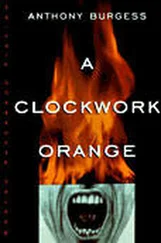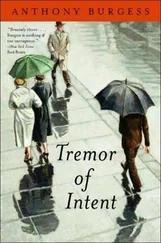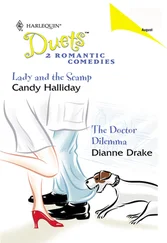"I wonder," wondered Enderby, "how much he minded. I wonder if he'll have an air crash waiting for me. Or skyjackers or whatever they're called."
"Everything going to be all right. He liked people to act, right? He was an actor first, right? Here everything going to be all right because of the publicity. One thing won't get in the newspapers, though. A man having to pretend to be William Shakespeare before he can dance the Beginning of the World. You sure are one great big pain in the ass," she said.
"I have this poem to write," Enderby said, having tasted with little relish the sweet fire of Southern Comfort. What he needed was a mug of tea, my kind of, with seven bags. "You gave me something to write about."
"Yeah, that was all it was for. Giving you something to write about. Brother, I been used for a lot of things in my life, but never before to give a guy something to write about."
"Well," Enderby said stoutly, "poetry has to go on. Nobody wants it, but we have to have it. There's something else I have to write first, though. A little story. Leave Well Alone or Leave Will Alone, some such title. About Shakespeare. If he'll allow it."
"You wanna get that stuff off?" the dresser asked. Meaning the beard and the wig and the 5 and 9. Shakespeare looked at Enderby from the mirror and coldly nodded.
The Muse
The hands of Swenson ranged over the five manuals of the instrument console and, in cross rhythm, his feet danced on the pedals. He was a very old man, waxed over with the veneer of rejuvenation chemicals. Very wise, with a century of experience behind him, he yet looked much of an age with Paley, the twenty-five-year-old literary historian by his side. Paley grinned nervously when Swenson said:
"It won't be quite what you think. It can't be absolutely identical. You may get shocks when you least expect them. I remember taking Wheeler that time, you know. Poor devil, he thought it was going to be the fourteenth century he knew from his books. But it was a very different fourteenth century. Thatched cottages and churches and manors and so on, and lovely cathedrals. But there were polycephalic monsters running the feudal system, with tentacles too. Speaking the most exquisite Norman French, he said."
"How long was he there?"
"He was sending signals through within three days. But he had to wait a year, poor devil, before we could get him out. He was in a dungeon, you know. They got suspicious of his Middle English or something. White-haired and gibbering when we got him aboard. His jailors had been a sort of tripodic ectoplasm."
"That wasn't in System B303, though, was it?"
"Obviously not." The old man came out in Swenson's snappishness. "It was a couple of years ago. A couple of years ago System B303, or at least the K2 part of it, was enjoying the doubtful benefits of proto-Elizabethan rule. As it still is."
"Sorry. Stupid of me."
"Some of you young men," Swenson said, going over to the bank of monitor screens, "expect too much of Time. You expect historical Time to be as plastic as the other kinds. Because the microchronic and macrochronic flows can be played with, you consider you ought to be able to do the same thing with -"
"Sorry, sorry, sorry. I just wasn't thinking." With so much else on his mind, was it surprising that he should be temporarily ungeared to the dull realities of clockwork time, solar time?
"That's the trouble with you young – Ah," said Swenson with satisfaction, "that was a beautiful changeover." With the smoothness of the tongue gliding from one phonemic area to another, the temporal path had become a spatial one. The uncountable megamiles between Earth and System B303 had been no more to their ship than, say, a two-way transatlantic flipover. And now, in reach of this other Earth – so dizzyingly far away that it was the same as their own, though at an earlier stage of history – the substance vedmum had slid them, as from one dream to another, into a world where solid objects might exist that were so alien as to be familiar, fulfilling the bow-bent laws of the cosmos. Swenson, who had been brought up on the interchangeability of time and space, could yet never cease to marvel at the miracle of the almost yawning casualness with which the nacheinander turned into the nebeneinander (there was no doubt, the old German words caught it best). So far the monitor screens showed nothing, but tape began to whir out from the crystalline corignon machine in the dead centre of the control turret – coldly accurate information about the solar system they were now entering. Swenson read it off, nodding, a Nordic spruce of a man glimmering with chemical youth. Paley looked at him, leaning against the parferate bulkhead, envying the tallness, the knotty strength. But, he thought, Swenson could never disguise himself as an inhabitant of a less well-nourished era. He, Paley, small and dark as one of those far distant Silurians of the dawn of Britain, could creep into the proto-Elizabethan England they would soon be approaching and never be remarked as an alien.
"Amazing how insignificant the variants are," Swenson said. "How finite the cosmos is, how shamefully incapable of formal renewals -"
"Oh, come," Paley smiled.
"When you consider what the old musicians could do with a mere twelve notes -"
"The human mind," Paley said, "is straight. Thought travels to infinity. The cosmos is curved."
Swenson turned away from the billowing mounds of tape, saw that the five-manual console was flicking lights smoothly and happily, then went over to an instrument panel whose levers called for muscle, for the blacksmith rather than the organist. "Starboard," he said. "15.8. Now we play with gravities." He pulled hard. The monitor screen showed band after band of turquoise light, moving steadily upwards. "This, I think, should be -" He twirled a couple of corrective dials on a shoulder-high panel about the levers. "Now," he said. "Free fall."
"So," Paley said, "we're being pulled by -"
"Exactly." And then: "I trust the situation has been presented to you in its perilous entirety. The dangers, you know, are considerable."
"Scholarship," Paley smiled patiently. "My reputation."
"Reputation," Swenson snorted. Then, looking towards the monitors, he said: "Ah. Something coming through."
Mist, cloudswirl, a solid shape peeping intermittently out of vapour porridge. Paley came over to look. "It's the Earth," he said in wonder.
"It's their Earth."
"The same as ours. America, Africa -"
"The configuration's slightly different, see, down there at the southern tip of -"
" Madagascar 's a good deal smaller. And, see, no Falklands."
"The cloud's come over again." Paley looked and looked. It was unbelievable.
"Think," Swenson said kindly, "how many absolutely incomputable systems there have to be before you can see the pattern of creation starting all over again. This seems wonderful to you because you just can't conceive how many myriads upon myriads of other worlds are not like our own."
"And the stars," Paley said, a thought striking him. "I mean, the stars they can actually see from there, from their London, say – are they the same stars as ours?"
Swenson shrugged at that. "Roughly," he said. "There's a rough kinship. But," he explained, "we don't properly know yet. Yours is only the tenth or eleventh trip, remember. To be exact about it all, you're the first to go to B303 England. What is it, when all's said and done, but the past? Why go to the past when you can go to the future?" His nostrils widened with complacency. "G91," he said. "I"ve done that trip a few times. It's pleasant to know one can look forward to another thirty years of life. I saw it there, quite clearly, a little plaque set up in Rostron Place: To the memory of G. F. Swenson, 1963-2094."
Читать дальше









